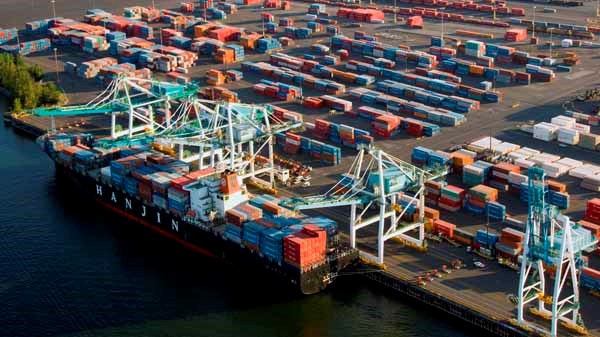-
Tips for becoming a good boxer - November 6, 2020
-
7 expert tips for making your hens night a memorable one - November 6, 2020
-
5 reasons to host your Christmas party on a cruise boat - November 6, 2020
-
What to do when you’re charged with a crime - November 6, 2020
-
Should you get one or multiple dogs? Here’s all you need to know - November 3, 2020
-
A Guide: How to Build Your Very Own Magic Mirror - February 14, 2019
-
Our Top Inspirational Baseball Stars - November 24, 2018
-
Five Tech Tools That Will Help You Turn Your Blog into a Business - November 24, 2018
-
How to Indulge on Vacation without Expanding Your Waist - November 9, 2018
-
5 Strategies for Businesses to Appeal to Today’s Increasingly Mobile-Crazed Customers - November 9, 2018
Hanjin bankruptcy causes global shipping chaos
South Korean container shipper Hanjin Shipping Co Ltd said on Friday its membership in the CKYHE shipping alliance has been suspended, adding to the troubles of the country’s top shipping firm.
Advertisement
Wal-Mart Stores Inc., the world’s largest retailer, said it was too early to see what effect the Hanjin situation will have.
Already, several ports, including Savannah in the United States, have closed the door to Hanjin vessels for fear they won’t be able to pay port fees.
Hanjin carries 7.8% of the USA market’s trans-Pacific trade volume: Millions of dollars worth of merchandise could be delayed by the shipper’s woes, some stuck in Asia and some at US ports, as trucking companies and others avoid taking up the cargo for fear of not being paid, according to the NRF.
The failure of the world’s seventh biggest containerline, one that controls almost a tenth of transpacific trade, has the US National Retail Federation (NRF), the world’s largest retail trade body urging Washington to liaise with Seoul to minimise disruption, particularly in ports and reports that US trucking might suffer due to cancelled haulage contracts.
The bankruptcy is having “a ripple effect throughout the global supply chain” that could cause significant harm to both consumers and the US economy, the association wrote.
Lawyers acting for two other firms, Hastay Marine and Montemp Marine, applied on August 31 to a court in California to have Hanjin’s assets in the USA including cash and property totaling more than $3-million seized to pay outstanding rental payments on two Hanjin ships, court documents showed.
Shipments bound for U.S. retailers are either sitting in Asia, onboard Hanjin ships now stuck out at sea, or in USA docks.
“Some of them are being impounded, others being barred from docking or discharging”, he said. A potential bankruptcy announcement would represent the biggest ever for a container shipping company, and retailers are rightfully concerned. Hanjin’s collapse has come during the shipping industry’s busiest season ahead of the year-end holidays.
Hanjin filed for court receivership this week after creditor banks chose to end financial support.
The younger Cho took over management of Hanjin Shipping two years ago from Choi Eun-Young, the widow of his younger brother Cho Soo-Ho, who ran the shipping firm until his death in 2006. Since vessels already are operating at high capacity, shippers may wind up paying a premium to squeeze their cargo containers on board, said Jock O’Connell, global trade adviser to Los Angeles-based Beacon Economics.
The price of shipping a 40ft container from China to the U.S. jumped by up to 50% in a single day, said Nerijus Poskus, director of pricing and procurement for Flexport, a licensed freight forwarder and customs broker based in San Francisco, who predicted the higher prices would last a month or two.
The price from China to West Coast ports rose from $1,100 per container to as much as $1,700 on Thursday, while the cost from China to the East Coast jumped from $1,700 to $2,400, he said.
Also, no Hanjin cargo will be loaded onto any of the other alliance members’ vessels.
Hanjin Shipping has been striving to cut its chartered rates and extend the maturity of debts in the face of worsening financial health stemming from a continued fall in freight rates.
Advertisement
Poskus expects the spike in prices to last a month or two. Most Filipino oil and coal traders do not use Hanjin vessels to deliver their goods, company sources said.





























